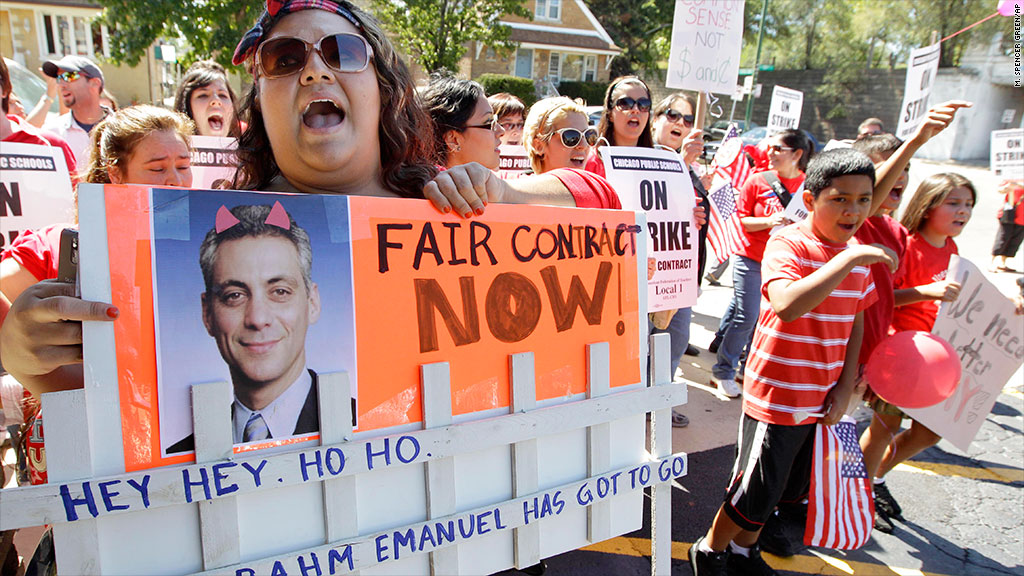
More than 1,000 current and retired Chicago teachers, police officers and other city workers are expected to rally at the state capitol Wednesday to fight possible cuts to their retirement benefits amid the city's brewing pension crisis.
After years of avoiding the issue, the city of Chicago is facing a massive spike in its annual bill for the pensions it promised current and retired workers. Next year, the city's required contribution will more than double to $1.07 billion.
City Hall says the nearly $600 million increase translates to the city's annual cost for 4,300 police officers or more than 3,750 firefighters or the resurfacing of nearly 16,000 city blocks.
At the same time, Chicago Public Schools, which have a separate budgeting process, have their own pension fight. The district will pay $613 million towards its teachers' pensions this year-- a big increase from prior years and more than 10% of the agency's total budget.
While the city and school district have to pay the pension bills, only state lawmakers have the authority to change pension benefits.
Related: CNN original series "Chicagoland" debuts March 6
Lawmakers have already pared back the benefits given to newly-hired workers. Now Democratic Mayor Rahm Emanuel and state legislators say more needs to be done to address "the biggest financial threat our city and school system have ever seen." Here's what's at stake:
- Retired and current city workers, who typically don't receive Social Security benefits, could face pension cuts.
- Residents could receive higher tax bills.
- City services, already hit by the recession, could be cut even further.
- Teachers could be laid off and class sizes could increase.
Related: A new normal for government retirees
A newly formed coalition of city unions called We Are One Chicago is arguing that retirees rely on their pensions, noting that they don't qualify for Social Security benefits. They argue that workers earn their benefits through significant contributions out of each paycheck and shouldn't pay the price for years of neglect by politicians.
Instead, the coalition proposes eliminating corporate tax subsidies, increasing income taxes for higher earners and raising the city's property tax rate, among other fixes.
"The fiscal problems Chicago faces cannot be solved solely by slashing modest pensions," the group said in a statement. "It will take a serious commitment of new revenue."
Related: Just how generous are Detroit's pensions?
Why pension bills are spiking: Chicago is home to one of the most troubled pension systems in the country. In total, the city's four pension funds, for firefighters, police officers, and two for other city workers face funding holes of nearly $20 billion. Meanwhile, the teacher's pension fund has its own $8 billion shortfall.
In other terms, city pension funds have set side only 36% of the money they need to pay future obligations. The teachers' fund has just over half. In contrast, a healthy pension fund should have a so-called funding ratio of at least 80%.
It wasn't always like this. The dot com bust and 2008 financial crisis hit the pension funds with significant investment losses, while lawmakers have approved benefit increases that added to the bill.
At the same time, the city and school district have been underpaying into the funds for years. Now, the agencies are required by state law to make the larger pension payments in an effort to return the various pension funds to solvency.
Related: Illinois OKs pension cuts in landmark reform
What's at stake for workers: Lawmakers have already approved pension cuts for state workers. Now Chicago employee unions are launching a preemptive against similar cuts being applied to city workers.
As part of a landmark pension overhaul for state workers, Illinois lawmakers in December voted to reduce annual cost-of-living increases for retirees, raise the retirement age for workers 45 and under and cap pensions for the highest-paid workers. The cuts are currently being challenged in court.
One of the law's biggest changes would reduce the annual cost of living increases received by retirees, significantly slowing the growth of pension checks each year. If the same change was applied to Chicago teachers' pensions, for example, retirees could see their retirement income cut by at least 10% over two decades, according to We Are One Chicago.
According to the coalition, the average retiree currently receives just over $40,000 in annual pension benefits.
Still, many retirees receive healthier checks. Retired firefighters, for example, received average benefits of more than $60,000 in 2012.
Yet other retirees already live on minimal benefits. "It is extremely difficult on the little I get now," said 81-year-old retired Chicago Department of Health worker Louise Bates-Spencer, who retired more than a decade ago and received around $18,000 in pension benefits last year.
What's at stake for residents: Without a pension overhaul, city and state leaders say residents could face tax hikes, gutted city services and larger class sizes in city schools.
Without service cuts, the city would have to bring in close to double the roughly $800 million it currently receives in property taxes, according to city documents.
"The resolution to this crisis must provide a secure retirement for them and retirees, while also looking out for taxpayers and homeowners who are working to make ends meet," Emanuel said in a statement. "We need a balanced approach."
Program note: Follow the real-life drama as Chicago looks to unite at a critical moment in the city's history. CNN Original Series "Chicagoland" airs Thursday nights, starting March 6 at 10/9c.

